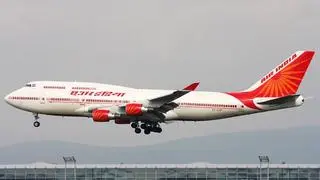Strange though it may sound it wasn’t a profit motive that led to the birth of India’s first Maintenance, Repair and Overhaul (MRO) facility. Air Works India (Engineering) Private Ltd was set up in 1951 at Mumbai airport, where it still exists, by two partners — a lawyer and someone who came from a wealthy background.
“It was a childhood passion which developed into an institution,” says Ravi Menon, son of one of the two founders of Air Works, who is currently its Executive Director.
With a last reported turnover of between ₹700 crore and ₹750 crore, Air Works is the largest independent MRO provider in India. It is also one of the only seven IATA-certified safety auditors and a global market leader for charter safety ratings.
The company also provides engineering, asset management and safety and technology solutions to the commercial and business aviation communities.
Teaching the trade
In reaching this position Air Works has also trained hundreds of people who can now be found in different aviation-related companies across the globe.
Says Ravi, “Air Works became a sort of transit camp for talent. People would do some training and then join Air Works to get some practical experience and exposure and then move on to various airlines. Even today, in almost all the airlines, there is somebody from Air Works. When you go to air shows in West Asia, almost every organisation has 30 per cent people who are from Air Works.”
When Air Works started, the going was not that good as there was no business. Hindustan Aeronautics Ltd had been set up in Bengaluru to do all the maintenance work and major checks on the Dakotas. During 1951-52, some airlines like Royal Nepal Airlines, Ariana and Iran Air decided that instead of flying their aircraft to Bengaluru for the checks they would try out Air Works because its location in Mumbai was more convenient.
The following year, G.D. Birla approached Air Works seeking help in locating a Dakota for his personal use.
Then, in the 1960s, Mahindra and Mahindra decided to go into aviation and acquired helicopters for agriculture spray operations. They used the Bell 47 G5 helicopters and when these came to Air Works for checks, the company had its first exposure to rotary wing machines.
“The challenge in those days was whether you would get a visa to go to America and get trained. My cousins and uncles and father would have found it difficult to get trained and qualified on each particular type,” Ravi, who joined the company in 1972, recalls.
However, as aviation started picking up, Air Works too decided to diversify. It started modifying the aircraft flown by State governments and making them more luxurious. The company purchased some first-class seats of Boeing 707 and modified them to put them on the Dakotas being flown in India.
“Culturally we never said no to anything. We never thought of problems or challenges as problems or challenges,” says Ravi.
Another opportunity came when the Indian Institute of Tropical Meteorology (IITM) picked Air Works to conduct rain-making experiments. For this Air Works acquired some Dakotas from Indian Airlines and, in discussion with the Institute, modified these to install a hopper and dispenser at the bottom of the aircraft as IITM intended to spray soapstone and common salt which would absorb moisture and lead to precipitation.
“While everyone avoided clouds, it was our duty to fly into them. We would fly into the clouds, spray the soapstones salt, get out and watch it precipitate from a distance,” Ravi laughs.
Next followed a request from the Space Application Centre to do the satellite payload testing for it. The payload was installed on an aircraft which Air Works flew and the Centre tracked. The Centre was developing a tracking system that eventually led to the Indian Space Research Organisation getting involved in the project. Air Works also did photography and located the first nuclear blast site in Pokhran.
Skymasters soar to life
Given this diverse portfolio it didn’t take long for inquiries to start coming in from West Asia for transporting perishables like vegetables, fruits, ice-creams and chilled meat. Now Air Works needed an aircraft that was bigger than the Dakotas that it had.
Eventually two or three Skymasters lying abandoned in Mumbai airport were identified and the company put “humpty dumpty” (as they were so huge) together again. The engines were overhauled abroad and the aircraft became operational.
“To make sure that there was no chance of the meat getting spoilt, it was loaded at the last minute, all 9 tonnes of it,” recalls Ravi.
Every day, flights took off from Mumbai to various destinations in West Asia, including Dubai, Abu Dubai, Muscat and Salalah. Air Works was the only one doing this business.
This business continued till about 1980 when the bigger aircraft with enough cargo space in the belly came in. The company moved back to maintenance work.
The next big chance came when the government allowed private airlines to set up shop in India. Jet Airways tied up with Air Works for starting the whole engineering set up for the airline. Ravi, however, admits that Air Works had “guidance and support” from experts in the airline business from Gulf Air and others, which Jet Airways brought in.
In 2004-05, after a lot of introspection within the family, it was decided to transform Air Works from being only a family business as the sector had opened up, a huge boom was expected but it didn’t have the money. The company decided to get a partner. A US-based private equity firm pumped in ₹50 crore into Air Works and Atul Punj, who was keen on aviation, also showed interest, so it was decided that the US partner, Punj and the Menons will each have a 33 per cent stake.
The business started growing, acquiring Air Livery, a paint company in the UK, setting up a facility in Hosur and, in 2008, getting certification for airlines’ narrow-body aircraft, like the Airbus-320 and Boeing 737. Another private equity pumped in money and the family’s share diluted to 13.5 per cent. “We have grown the business. From a ₹50 crore valuation we now have a turnover in the region of ₹700-750 crore. We knew the business very well. What we did not know was about finance — raising capital,” Ravi says.
With such vast experience, both in the business and in life Ravi is pragmatic about the future when he says that it is more than likely that after this generation (Ravi’s cousins also work in Air Works), the Menons may not be associated with the company.
“There could be opposing opinions (between the various children), perspectives and views which could lead to a clash. If a clash happens, the company is finished. The collateral damage is that the family fabric will be destroyed,” Ravi says.







Comments
Comments have to be in English, and in full sentences. They cannot be abusive or personal. Please abide by our community guidelines for posting your comments.
We have migrated to a new commenting platform. If you are already a registered user of TheHindu Businessline and logged in, you may continue to engage with our articles. If you do not have an account please register and login to post comments. Users can access their older comments by logging into their accounts on Vuukle.